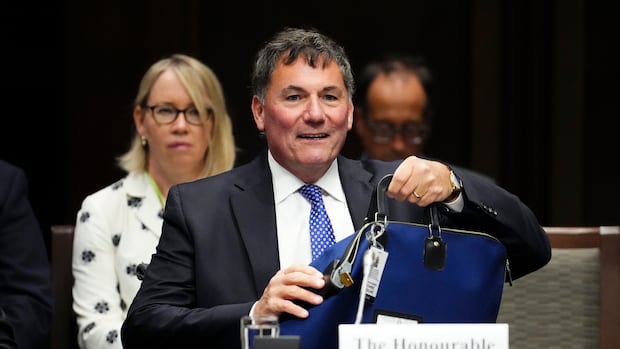Partial relief from steel tariffs is the modest expectation of the Canadian delegation heading to the White House for Tuesday’s meeting between Prime Minister Mark Carney and U.S. President Donald Trump.
According to three Canadian sources speaking to CBC News and Radio-Canada, the hope is that any sort of steel tariff relief will create a framework or an example for how other tariffs already imposed on Canada could be lowered as well.
CBC News and Radio-Canada are not naming the sources, as they are not authorized to speak publicly about sensitive matters.
Two of the sources told Radio-Canada that Trump extended the invitation to Carney. It started with an informal verbal invitation, when the leaders met in New York City on the sidelines of the UN General Assembly in September. Follow-up conversations between Canadian and U.S. teams formalized the date for Tuesday.
The sources also see this moment as an opportunity for Carney to improve his relationship with Trump after a tumultuous summer. Trade deadlines passed without new agreements, new tariffs have been imposed on Canada, and there have been difficult moments in the relationship, including Trump’s outrage over Canada’s proposed Digital Services Tax.
While the sources all characterize the ongoing trade talks between Canada and the U.S. as positive, there remains a nervousness that comes with Trump-related events, given how unpredictable the president had proven to be.
Typically, a leader-to-leader event of this nature would include the announcement of finalized agreements or plans.
The sources speaking to CBC News and Radio-Canada are cautious when discussing goals, given Trump’s unpredictable decision making. The sources feared setting expectations, only to see an unexpected reversal.
The U.S. has imposed a wide range of tariffs on Canada, leading to job losses, economic uncertainty and all-round financial pain. At the same time, Trump has also applied a patchwork of carveouts, easing some pinch points.
Dominic LeBlanc, minister responsible for Canada-U.S. trade, tells a Senate committee that conversations continue on U.S. sectoral tariffs on Canadian goods and there has been no suggestion to have those discussions folded in the upcoming CUSMA review.
There are no exceptions for Canadian steel and aluminum tariffs, which currently sit at 50 per cent. And while no world leader has successfully negotiated a way out of these specific tariffs, rates are lower for certain countries that reached broad trade agreements with the U.S., including the U.K.
No one that CBC News and Radio Canada spoke with is expecting a broad trade deal to be announced, but there are hopes that movement on steel tariffs could pave the way for future agreements to lower additional tariffs as well.
Relationship building
Carney and Trump have met face to face at least three times since the Canadian prime minister was elected this past spring.
While Trump’s tone toward Canada certainly appears to be more positive than it was during Prime Minister Justin Trudeau’s final months in office, there are challenges.
After making progress in trade talks on the sidelines of the G7 summit in Kananaskis, Alta., in June, Carney announced that both sides had set a goal of reaching a new broad Canada-U.S. trade and security agreement within 30 days.

“I’m looking forward to continuing this work at this summit and in the weeks ahead,” Carney said at the time.
Over a week later, Trump abruptly announced his intention to pause talks, angered by Canada’s proposed Digital Services Tax, which would have an impact on American tech firms.
Trump lashed out on social media, and in front of reporters during an Oval Office event. Tensions started to ease when Canada abandoned the tax, and talks resumed. Though hope for a deal began to fade quickly.
The original 30 day deadline was extended by Trump, who then threatened to increase tariffs unless a deal was reached by Aug. 1.
Again, talks failed to reach a breakthrough, and border security and fentanyl-related tariffs increased from 25 to 35 per cent. While there are exemptions for CUSMA-compliant goods, Mexico, which is also a member of the trilateral trade agreement, was spared from the increase.
Canada has since rolled back counter-tariffs on U.S. goods, partly because it hopes the White House will view the move as an act of goodwill, to get talks progressing.
U.S. President Donald Trump said Tuesday he again told an unnamed Canadian official that the country should consider joining the U.S. as the 51st state, while at an event in Virginia speaking to senior military officials.
On top of the trade difficulties, Trump also continues to make the case that Canada would be better off as the 51st state.
Canadian officials hoped that kind of rhetoric would have stopped after Trudeau left office, given Trump’s personal animosity toward the previous prime minister.
While the jabs are not as frequent, he made them during an interview this summer on Fox News, and during a rambling speech to U.S. military leaders last week.
In this difficult moment, while there is hope for progress by Canadian officials, there’s a fear of the unknown with Trump — a fear of making things worse.








